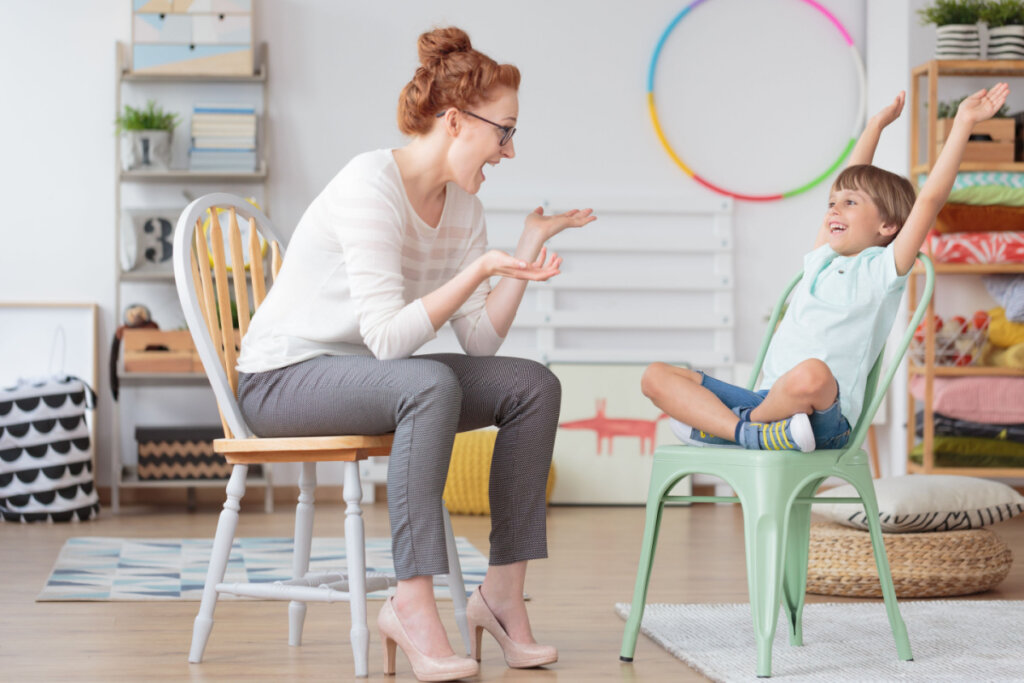At What Age Can a Child Start Therapy?


Written and verified by the psychologist Elena Sanz
Fortunately, in recent years, mental health care has started to be given the importance it deserves. Indeed, increasingly more people are willing to turn to a professional and seek psychological support to overcome adverse moments and emotional difficulties. However, certain issues can cause us doubt and prevent us from making decisions. Among them is the dilemma of at what age a child can start therapy.
This issue is especially relevant for people who have children and don’t know how to support them or alleviate their emotional suffering. It’s also applicable to adolescents who are going through difficult stages and wonder if psychotherapy could guide them or provide them with valuable tools. In order to clear up this type of doubt, we’re going to share some important information.

Therapy for children and adolescents
Of course, psychological intervention is available to any adult who needs help or guidance at any given time. Moreover, the individual doesn’t have to be suffering from a mental disorder to benefit from professional assistance.
Therapy helps us to get to know each other, understand each other, and acquire new tools that simplify our daily routines. As we mentioned earlier, we’ve become increasingly aware of this reality.
However, when it comes to children and adolescents, things aren’t always so clear. In fact, we may even wonder if it’s possible to visit a therapist at this stage of life. After all, at these ages, children are still developing, their brains aren’t yet mature, and their personalities aren’t yet formed. As such, we might believe it’s preferable to wait or that their difficulties are just a stage they’re going through. In fact, we tend to believe that it’s all a result of their immaturity and inexperience. However, in reality, these early stages are crucial when it comes to their well-being.
As a matter of fact, many of the most frequent mental illnesses (like anxiety, depression, addictions, and eating disorders) begin during childhood and adolescence. Moreover, if not properly attended to, they tend to become more severe and chronic over time, taking deeper root in adulthood.
In addition, minors don’t have the same tools as adults for navigating adversity. They’ve not yet learned to manage their emotions, make decisions, self-regulate, and rationalize their experiences. As a result, certain events that, from an adult perspective, may not seem to be of great importance, can affect them deeply.
A psychologist specializing in the child and youth population can provide useful guidelines and tools, accompany these processes, and detect warning signs of any developing disorders that require intervention. Leaving it for later is never the best option.
At what age can a child go to therapy?
In light of the above, it’s clear that minors can greatly benefit from psychological support. However, when’s the right time? At what age can a child go to therapy?
When it comes to young children, it’s advisable to wait for the time when they can communicate to a certain extent, and are able to understand or follow certain instructions in order to work together. This occurs at approximately four or five years of age.
For children of this age, the therapist must adapt the techniques and dynamics of the therapy. As a rule, they use games, drawings, and other symbolic elements to allow the child to project or communicate their reality so the therapist can successfully work with them.
However, children younger than this can also exhibit problems and difficulties. Indeed, infants of two or three years may already show signs that intervention or change is necessary. For example, they may exhibit an inhibited temperament, become anxious or attached, be overly irritable, or be unable to relate normally to other people.
These signs shouldn’t be overlooked. Although, at this age, the intervention will be carried out mainly with the parents. They’ll be provided with information and certain guidelines. This isn’t only because direct work with preverbal children is much more complex, but also because the performance and educational style of the parents has a great influence on the well-being of the child and their problems.

Therapy is adapted to the age of the patient
Finally, there’s no minimum age for receiving psychological support. When any difficulty arises, it’s important to consult specialized professionals who can guide and accompany the young person.
Depending on the individual’s stage of life, the procedures will be adjusted to respond to their needs. In the case of children, the work of the parents will be essential. Therefore, it isn’t wise to underestimate their problems or wait for them to improve over time. If in doubt, it’s important to seek help.
All cited sources were thoroughly reviewed by our team to ensure their quality, reliability, currency, and validity. The bibliography of this article was considered reliable and of academic or scientific accuracy.
- Bonafé, M., Pereira, C. G., & Saboya, S. L. (2008). El síntoma del niño y la dinámica familiar: la orientación de padres en la psicoterapia infantil. Vínculo, 5(2), 194-207.
- Meléndez, J. C., Navarro-Pardo, E., Sales, A., & Sancerni, M. D. (2012). Desarrollo infantil y adolescente: trastornos mentales más frecuentes en función de la edad y el género. Psicothema, 24(3), 377-383.
This text is provided for informational purposes only and does not replace consultation with a professional. If in doubt, consult your specialist.








